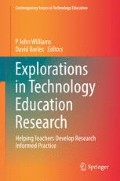Abstract
This chapter investigates the perceptions held by pupils, across four Northern Ireland secondary schools, towards routine school-based practical work activities and project work in technology and design (T&D) and also that which had been contextualised within an industrial setting. The views of the heads of departments (HoDs) of each school and four local industrialists were also probed in relation to their views on the benefits or otherwise of both types of practical work.
Access this chapter
Tax calculation will be finalised at checkout
Purchases are for personal use only
References
Benson, C., & Lunt, J. (2011). We’re creative on a Friday afternoon; investigating children’s perceptions of their experience of design and technology in relation to creativity. Journal of Science Education Technology, 20(5), 679–687.
Dakers, J. (2007). Incorporating technological literacy into classroom practice. In M. J. De Vires, R. Custer, J. Dakers, & G. Martin (Eds.), Analyzing best practices in technology design (1st ed., pp. 125–137). Rotterdam: Sense Publishers.
Hennessy, S., & Mccormick, R. (1994). The general problem-solving approach in technology education. Myth or reality? In F. BANKS (Ed.), Teaching technology (1st ed., pp. 94–110). Buckingham: Open University.
Hill, A. M. (1998). Problem solving in real-life contexts: An alternative for design in technology education. International Journal of Technology and Design Education, 8(3), 203–220.
Mettas, A., & Constantionou, C. (2007). The technology fair: A project-based learning approach for enhancing problem solving skills and interest in design and technology education. International Journal of Technology and Design Education, 18(1), 79–100.
Pedersen, S., & Min, L. (2003). The transfer of problem-solving skills from a problem-based learning environment: The effect of modeling an expert’s cognitive processes. Journal of Research on Technology in Education, 35(2), 303–320.
Peraklya, A., & Russuvuori, J. (2011). Analyzing talk and text. In N. Denzin & Y. S. Lincoln (Eds.), The SAGE handbook of qualitative research (4th ed., pp. 234–306). London: SAGE.
Post, T., & Van Der Molen, J. (2014). Effect of company visits on Dutch primary school children’s attitudes towards technical professions. International Journal of Technology and Design Education, 24(4), 349–373.
Prezter, W., Rogers, G., & Jeffery, B. (2007). A model technology educator: Thomas A. Edison. Technology Teacher, 67(1), 27–31.
Seidman, I. (2013). Interviewing as qualitative research: A guide for researchers in Education and Social Sciences (4th ed.). Columbia University USA: Teachers College Press.
Warner, S. A. (2002). Teaching design: Taking the first steps. The Technology Teacher, 62(4), 7–10.
Author information
Authors and Affiliations
Corresponding author
Editor information
Editors and Affiliations
Appendices
Appendices
Appendix 1
Interview Schedule One
-
Question 1: What practical projects are you working on at the moment?
-
Question 2: What practical projects did you complete Years 8 and 9?
-
Question 3: What do you value doing in T&D and why?
-
Question 4: What do you not value doing in T&D and why?
-
Question 5: What type of projects and practical work would you like to be included in T&D?
-
Question 6: In what ways have the practical projects you have completed in T&D been useful to you in your everyday life?
-
Question 7: In what ways do you think that the practical projects you have completed in T&D might be useful to others?
-
Question 8: Which of the other STEM subjects do you think have links with T&D?
Appendix 2
Interview Schedule Two
-
Question 1: What did you learn from your visit to the local industry?
-
Question 2: Did you think that the visit to the local industry was a positive experience, and if so why?
-
Question 3: How useful to your everyday life was the industrial visit linked project?
-
Question 4: Did the visit to the local industry and associated project work enable you to better understand the links between STEM subjects, and if so, how?
Appendix 3
Interview Schedule for the Heads of Departments
-
Question 1: Did you think the visit to industry and associated project was a good idea? And if yes, why? And if no, why?
-
Question 2: Do you think the industrial visit enhanced the learning experiences of the pupils in relation to the associated project work? And if yes, why? And if no, why?
-
Question 3: Do you think that the industrial visit and associated project work was useful to the pupils in terms of being useful to their everyday lives?
-
Question 4: Do think there is merit in the school having a partnership with local industry? And if yes, why? And if no, why?
Appendix 4
Interview Schedule for Industrialists
-
Question 1: Do you consider that relating secondary school-based T&D project work to a real-life industrial environment brings value to this work? If yes, why? If no, why?
-
Question 2: Do you consider that visits to industry by post-primary pupils are of value to their everyday lives? If yes, why? If no, why?
-
Question 3: Do you consider that the visits to industry can enable pupils to better understand the connections between the STEM subjects? If yes, why?
Rights and permissions
Copyright information
© 2019 Springer Nature Singapore Pte Ltd.
About this chapter
Cite this chapter
McGeown, K. (2019). Secondary Pupils’ Perceptions of Their Experiences of Practical Work in Technology and Design. In: Williams, P.J., Barlex, D. (eds) Explorations in Technology Education Research. Contemporary Issues in Technology Education. Springer, Singapore. https://doi.org/10.1007/978-981-13-3010-0_5
Download citation
DOI: https://doi.org/10.1007/978-981-13-3010-0_5
Published:
Publisher Name: Springer, Singapore
Print ISBN: 978-981-13-3009-4
Online ISBN: 978-981-13-3010-0
eBook Packages: EducationEducation (R0)

